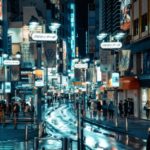 Cities are widely regarded as largely emergent entities that evolve of their own volition, and at their own pace, but that doesn’t stop us trying to direct the path of change. New research from the University of Chicago highlights how not only do cities evolve at a gradual pace, but they also contain a number of paradoxes.
Cities are widely regarded as largely emergent entities that evolve of their own volition, and at their own pace, but that doesn’t stop us trying to direct the path of change. New research from the University of Chicago highlights how not only do cities evolve at a gradual pace, but they also contain a number of paradoxes.
For instance, cities provide the engine for growth as well as the environment for poverty and inequality to persist. The authors argue that to create more equitable and prosperous cities means moving beyond these apparent paradoxes.
“To understand how cities can be simultaneously fast and slow, rich and poor, innovative and unstable, requires reframing our fundamental understanding of what cities are and how they work,” they explain. “There is plenty of room in cities to embody all this complexity, but to harness natural urban processes for good requires that we modify current thinking and action to include different scales and diverse kinds of people in interaction.”
Process of change
The paper describes cities along a sliding scale of processes of change via mathematical models that highlight the balancing act people deploy to manage their resources. The authors highlight that for most of us, these resources vary over time in often unpredictable ways, with our collective efforts then resulting in meaningful change at the city and nation level.
The researchers highlight how relative changes in the status of cities are often incredibly slow and tied to distinct variations in their growth rates, which are commonly very small in developed nations. This results in the impact of innovation being barely noticeable across cities, with timescales often measured in decades.
The paper also highlights the importance of uncertainty on innovation and growth, with not only poverty causing this uncertainty but also events such as the current pandemic. What’s more, policies that are designed to promote aggregate growth, such as that measured by GDP, often exacerbate inequality and social instability.
“Growth and change accumulate through the compounding of many small changes in how we lead our daily lives, allocate our time and effort, and interact with each other, especially in cities. Helping more people be creative and gain agency, in part by reducing crippling uncertainties, is predicted to make all the difference between a society that can face difficulties and thrive or one that becomes caught up in endless struggles and eventually decay,” the authors conclude.